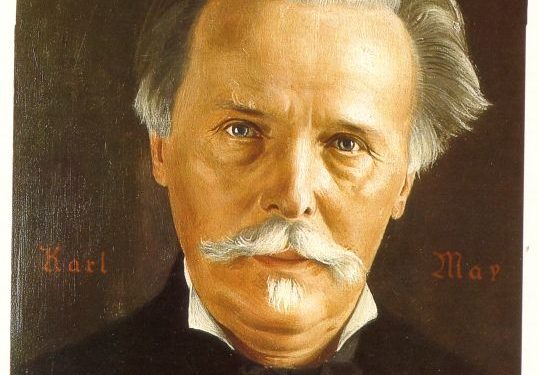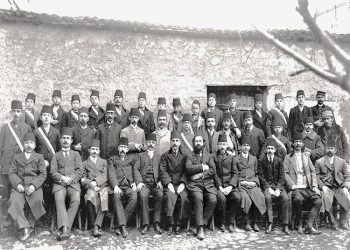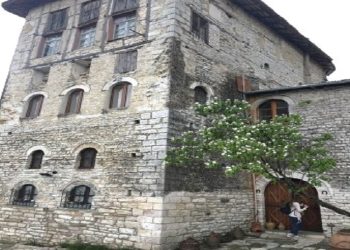Part One
THE NOTION OF “ALBANIAN” IN THE WORK OF KARL MAY
Karl May
Memorie.al / Many people have heard of Karl May’s famous novel, “Journey to the Land of the Albanians,” and many others, although they don’t know German, are very familiar with the title of his famous novel in German, “Durch das Land der Skipetaren.” As for this work (written in 1892), it is in fact only a part of a cycle, belonging to the so-called “Travel Tales.” But what interests us in this article is to highlight a very positive aspect, which is recognized as a special merit of Karl May.
The mention of the name “Albanian” (Skipetar) by him, right in the title of the book and then in the content of his work, as shown by the observation and research of many other later works, became the starting point for many other authors, not only in the German-speaking world but also in the Anglo-Saxon (and later the global) one, to know more about the Albanians and Albania, by their true name. “He,” someone emphasizes, “is not the first to introduce this notion into the German language, but he has the exclusive merit for its popularization, thanks to the very meaningful title at the head of the book.”
Someone else writes: “We should not underestimate the influence of Karl May, who transformed the name ‘Schkypetaren’ into a very popular notion – which he could not have invented himself – and surely he was the first to introduce it into Europe, and from there, it was then spread throughout the entire Anglo-Saxon literary world.”
But to treat this thesis more broadly and concretely, let’s recall and see what the German researcher, historian Dr. Michael Schmidt-Neke, currently the vice-chairman of the German-Albanian Friendship Association and a member of the “Karl May” Association, writes in a detailed critique (from a few years ago) on this occasion, titled “On Albanians and Arnaouts – The image of Albanians and Albania in the work of Karl May”: “No novel title by May has been absorbed and interpreted as intensively as ‘Durch das Land der Skipetaren’!” (Journey to the land of the Albanians).
A generation of authors, who have published well-known works on Albania, have based their word choices on and related to those made by May, says the German researcher. Karl May is by no means the first to have introduced the self-determination of the Albanians as “Shqiptar,” but he certainly has the exclusive merit for its popularization, thanks to the very meaningful title at the head of the book. In the 17th century, the Albanians replaced the name “Arbër” with “Shqiptar,” which most likely describes someone who speaks clearly.
The German critic further states that etymologists who link it to the word “shqipe” (i.e., eagle) belong to national romanticism and for a long time, they are no longer taken very seriously. In the German-speaking area, it was initially (until a little after 1900) taken as a form borrowed from Italian, being used more with the name “Albanesen,” which was then transformed into “Albanier,” which itself, in competition with the word “Albaner,” almost lost in favor of the latter.
“The self-determination of the Albanians with this word, namely ‘Schkipetaren,’ was used in a book title for the first time by Xylander, in 1835, in one of the first monographs published on the Albanian language in German,” further emphasizes Dr. Schmidt-Neke.
This expression (i.e., this name) found its place more and more in books and collections in German, mainly dedicated to the Balkans: Robert spoke in 1844 about “Skipetars”; Kohl, meanwhile, even debated in this case that it was an Albanian word; Gopcevic used the word with diacritical marks in 1881: “Skipetaren.”
“Shqiptar” Only in German and Serbian
But in a way that managed to have a wide influence on the public, May first introduced this word as a name for a people in the years 1887-88 in the “German Basic Dictionary,” where the series of publications with the inscription “Durch das Land der Skipetaren” was closed with the last chapter of volume 4, completely then volume 5 and finally volume 6.
May is not consistent linguistically: besides the word “Skipetar,” the other, more correct form “Schkipetar” is also found, which in the plural then, normally becomes, just as in the title, “Skipetaren,” but we often encounter it in an irregular form, such as “Skipetars.” Furthermore, May’s critic emphasizes a very interesting and easily verifiable fact in the present day: In no other language, he emphasizes, besides German (and perhaps Serbian, where this word has a pejorative connotation, i.e., where the word “albanci” is officially used), has the word “shqiptar,” even in the literature on Albania, known such a wide spread.
The Fluctuations and Influence of May’s Work
The influence of the book’s title and the mention of the name of this people by Karl May here-without claiming that he fulfilled everything correctly-is very clearly achieved through some very meaningful examples: a little after Karl May’s death, the 3rd volume of “Reisen und Abenteuer” (Travels and Adventures) by Dr. Franz Sättler with the title “Bei den Arnauten” (Among the Arnauts) was published in Berlin. The book in question was in fact dedicated to the work of Karl May, preceded by some homage verses from Sättler.
It can be read as the only one of the countless characters and endless action elements that May created, where he himself takes on the role of the narrator in the first person, of the all-powerful Kara Ben Nemsi, fighting against Albanian bandits and outlaws. The travel photos, which show the author and his wife in different Albanian environments, look more than comical.
And yet, Sattler’s knowledge (an orientalist’s) of the country, people, and language seems to have been several times better than May’s own. The ethnographer Hugo Adolf Bernatzik, he emphasizes, is the author of one of the most well-known and highest-circulating books on Albania. For later editions, he changed the title of his work from “The Forgotten Land of Europe” (in the original: Europas vergessenes Land) to “Albanien – Das Land der Schkipetaren” (Albania – the land of the Albanians).
Despite the correct form in the linguistic aspect, it was nevertheless a borrowing from the very popular title of Karl May’s work. Not in the title, but in the content of the book, May’s work nevertheless took a clear place in terms of historical values, emphasizes the critic Schmidt-Neke, bringing a more than interesting example: Hitler’s special envoy for the Balkans during the Second World War, an avid reader of May, Hermann Neubacher, in his memoirs on this occasion, refers to May’s definitions of the friendship that Albanians in general had for Germans.
In the Footsteps of Karl May
Jonny Behm (pseudonym for Elisabeth Joost) started under the motto “Balkan, Bakschisch und Basare” (in Albanian: The Balkans – Baksheesh and Bazaars) – two reporters in the footsteps of Karl May in the 30s, who traversed the itinerary from Kotorr (Montenegro) to Edirne (Turkey). In 1976, a collection of reports on the countries that were mentioned in May’s works was published; Josef Nyary, accompanied and observed by people paid by the Albanian state, undertook a journey “Through the land of the Albanians.”
Meanwhile, in the former German Democratic Republic, Karl May, until around 1980, met with complete rejection. This, however, did not prevent publications about Albania from referring to the famous title of Karl May.
Furthermore, the German researcher, Dr. Schmidt-Neke, cites other examples that further reinforce the thesis raised at the top of our article: “Das Land der Skipetaren” by Kurt Rueckmann, for example, refers to May’s preface and quotes exclusive parts from May in the first chapter of his book, only to then suddenly distance himself from his adventure stories and criticize the lack of information among Germans, which had led, according to him, “millions of Germans” to mistake evaluations of Albania.
Thus, under the title “Im Land der roten Skipetaren” (In the land of the red Albanians), Detlef Schneider, at that time the editor-in-chief of the Organ of the German Communist-Marxist Leninist Party, “Roter Morgen” (Red Morning), pro-Enverist and certainly very pro-Albanian at that time (and completely banned by the government of the former GDR), in 1980 published his propagandistic view on the country and people of Albania.
In his preface on this occasion, he textually refers to the fictional and romantic presentation made a century earlier by Karl May; while he certainly opposed May himself and the many negative reports about Albania at that time, showing a realistic picture, according to him, of a different Albania.
The Historical Approach
In terms of the historical approach it offers, says the German critic, the monograph of the German Wehrmacht officer and later Austrian ambassador to Yugoslavia and Albania, Walther Peinsipp, on Albanian customary law, seems to be very interesting on the other hand. Right in the title “Das Volk der Schkypetaren” (The People of the Albanians), the well-known association is again highlighted. / Memorie.al
















